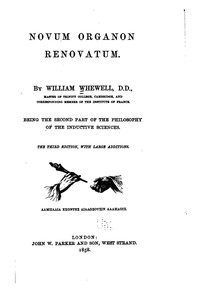Novum organon renovatum by William Whewell
"Novum Organon Renovatum" by William Whewell is a scientific publication written in the mid-19th century. This work serves as a sequel to Bacon's "Novum Organon," aiming to refine and update the methods of scientific discovery based on the significant advances in knowledge since Bacon's time. The book addresses the principles and methodologies that underlie the inductive sciences, emphasizing the need for a systematic approach to accumulate and formulate scientific truths. The opening
portion of the text introduces Whewell's purpose in restructuring Bacon's methods to better fit the current state of scientific understanding. He argues that although Bacon's contributions were groundbreaking, a contemporary revision is necessary to account for the real advancements in scientific disciplines such as physics, chemistry, and biology. Whewell outlines the foundations of his approach, focusing on the explication of ideas and colligation of facts as essential processes for constructing scientific knowledge. This section highlights the philosophical implications of these methods and sets the stage for his exploration of various scientific concepts in the subsequent chapters. (This is an automatically generated summary.)
Read or download for free
| Reading Options | Url | Size | |||
|---|---|---|---|---|---|
| Read now! | https://www.gutenberg.org/ebooks/69764.html.images | 949 kB | |||
| EPUB3 (E-readers incl. Send-to-Kindle) | https://www.gutenberg.org/ebooks/69764.epub3.images | 493 kB | |||
| EPUB (older E-readers) | https://www.gutenberg.org/ebooks/69764.epub.images | 501 kB | |||
| EPUB (no images, older E-readers) | https://www.gutenberg.org/ebooks/69764.epub.noimages | 408 kB | |||
| Kindle | https://www.gutenberg.org/ebooks/69764.kf8.images | 751 kB | |||
| older Kindles | https://www.gutenberg.org/ebooks/69764.kindle.images | 751 kB | |||
| Plain Text UTF-8 | https://www.gutenberg.org/ebooks/69764.txt.utf-8 | 787 kB | |||
| Download HTML (zip) | https://www.gutenberg.org/cache/epub/69764/pg69764-h.zip | 459 kB | |||
| There may be more files related to this item. | |||||
Similar Books
About this eBook
| Author | Whewell, William, 1794-1866 |
|---|---|
| LoC No. | 05017761 |
| Title |
Novum organon renovatum Being the second part of the philosophy of the inductive sciences |
| Original Publication | United Kingdom: John W. Parker & Son,1858. |
| Credits | Ed Brandon from materials kindly provided by the Internet Archive, and with help gratefully received from various voluntary sources. |
| Reading Level | Reading ease score: 52.4 (10th to 12th grade). Somewhat difficult to read. |
| Language | English |
| LoC Class | Q: Science |
| Subject | Science -- Philosophy |
| Category | Text |
| EBook-No. | 69764 |
| Release Date | Jan 10, 2023 |
| Copyright Status | Public domain in the USA. |
| Downloads | 504 downloads in the last 30 days. |
| Project Gutenberg eBooks are always free! | |

